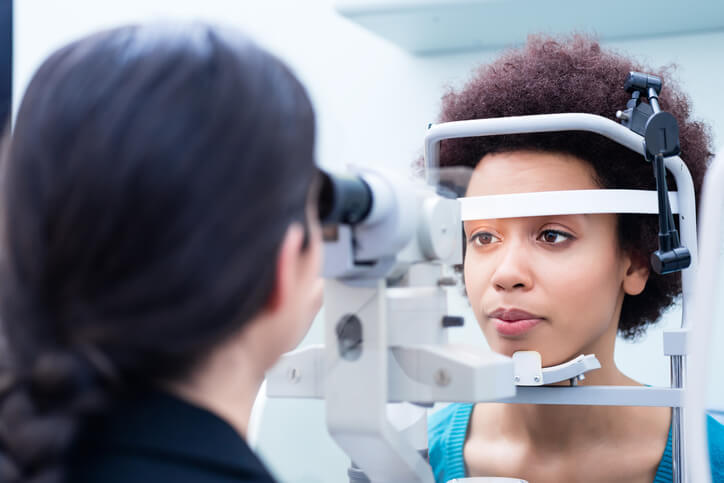Does Medicaid Cover Vision?
- Medicaid vision coverage varies by state. Here we provide a general breakdown of Medicaid vision coverage, along with how to look up vision benefits in your state Medicaid program.

Medicaid vision coverage is considered an optional benefit, which means Medicaid vision benefits may vary by state.
Because each state is responsible for running its own Medicaid program, the benefits Medicaid covers in your state may be different than what’s covered in another state.
If you're eligible for Medicare, you won't typically be able to get coverage for routine vision care through Original Medicare (Medicare Part A and Part B). You may be able to get vision coverage through a Medicare Part C (Medicare Advantage) plan, however. Learn more about the vision coverage options available where you live.

Learn More About Medicare
Join our email series to receive your free Medicare guide and the latest information about Medicare.
By clicking "Sign me up!" you are agreeing to receive emails from HelpAdvisor.com
Thanks for signing up!
Your free Medicare guide is on the way.
Make sure to check your spam folder if you don't see it.
Vision Care Is an Optional Medicaid Benefit
Medicaid benefits are split into two categories:
- Mandatory Medicaid benefits
Federal guidelines mandate that each state Medicaid program provide coverage for a select set of benefits. - Optional Medicaid benefits
Optional benefits are those that are approved for coverage but not required. It is up to each state to decide which optional benefits they offer as part of their Medicaid program.
Optometry services and eyeglasses fall under the optional category, meaning Medicaid’s vision coverage will differ by state.
The National Academies of Sciences, Engineering and Medicine offers this list of the vision benefits offered by each state’s Medicaid program.
Contact your state Medicaid program and ask about what vision coverage is offered.
What Vision Benefits Does Medicaid Cover in Every State?
For children under the age of 21 who are eligible for Medicaid’s Early and Periodic Screening, Diagnostic and Treatment (EPSDT) benefits, the cost of eye exams and eyeglasses are covered by Medicaid, no matter where they live.
Medicaid typically pays for medically necessary eye care, which includes treatment for eye injuries, conditions, diseases or symptoms of illness.
While routine eye exams are not included as mandatory Medicaid coverage, an eye exam that is deemed to be medically necessary is covered.
Does Medicaid Cover Eye Exams?
Most state Medicaid programs cover eye exams for beneficiaries 21 years of age and older. Some state Medicaid programs also cover a pair of eyeglasses and/or contact lenses upon an eye exam. However, these remain optional benefits and may not be offered as a covered benefit in every state.
Some Medicaid programs include coverage for refraction exams, which test the patient’s ability to see an object at a specified distance.
Does Medicaid Cover Eyeglasses?
Medicaid generally pays for eyeglasses and basic frames when needed to correct vision problems brought on by accident or disease. Medicaid coverage for eyeglasses may be less frequent when the prescription does not result from a medically necessary eye exam.
Does Medicaid Pay for Contact Lenses?
Like eyeglasses, contact lenses may be covered by Medicaid when needed to correct vision problems brought on by accidents or diseases. Medicaid typically does not cover contact lenses when simply used for cosmetic purposes.
Will Medicaid Cover Eye Surgery?
Medicaid may cover a variety of eye surgeries when performed by an ophthalmologist.
Surgeries and procedures to cover the following conditions may be covered in many states, under certain circumstances:
- Cataracts
- Glaucoma
- Endoscopic Dacryocystorhinostomy to treat a blocked tear duct
- Scleral Buckle or Pneumatic Retinopexy (detached retina)
- Vitrectomy treatment
- Strabismus (crossed, walled or lazy eye)
- Laser Vitreolysis to treat “floaters” following cataract surgery
- Superficial Keratectomy (nodular degeneration)
- Keratoprosthesis to treat corneal disease
- Pterygium (surfer’s eye)
Medicaid rarely pays for LASIK eye surgery as it’s not considered medically necessary.
Find Eye Doctors Who Accept Medicaid
Use the contact information from the official Medicaid website to find your state’s Medicaid website where you may search the directory of eye doctors who accept Medicaid.
Your Medicaid insurance card may also have information about the company that manages the plan and how to access the directory of participating providers.





